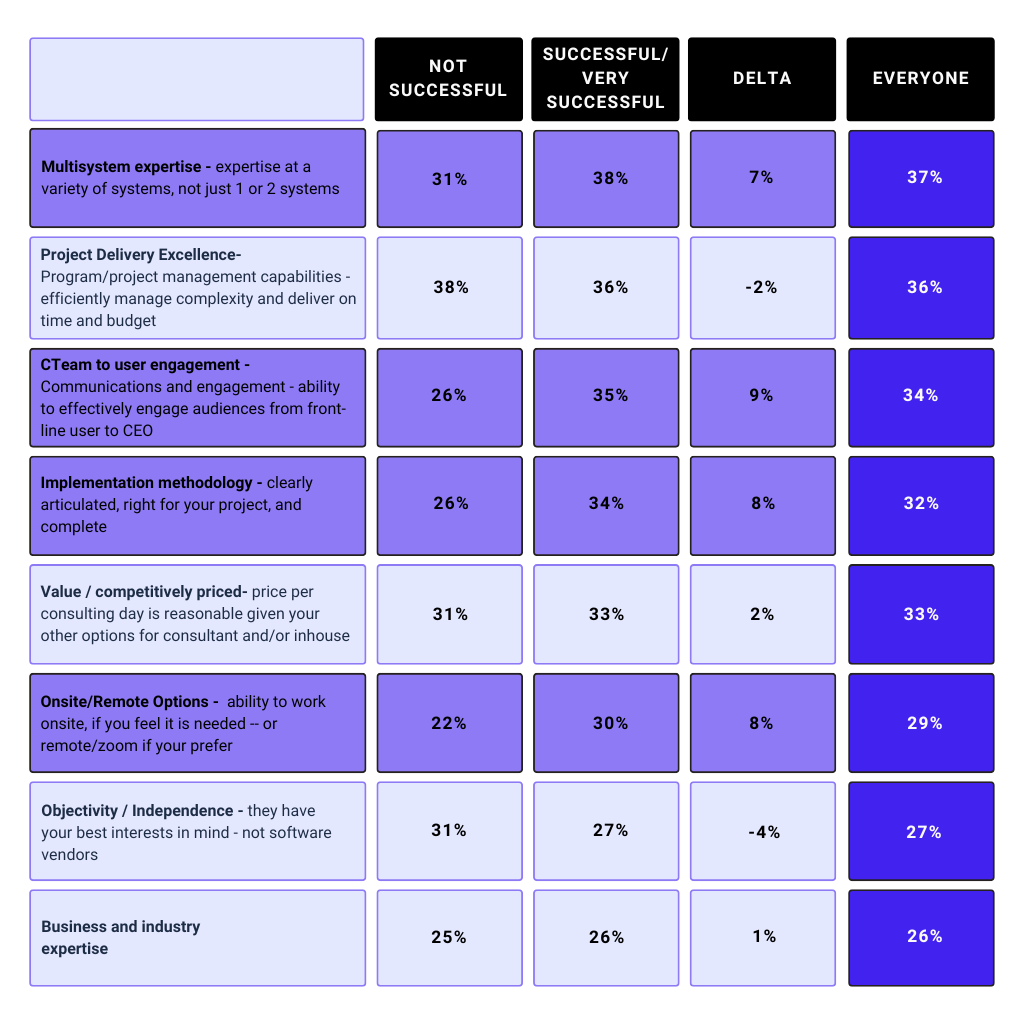A very large part of your software implementation success or failure is determined whether you try to self implement or hire a software consultant. Self-implementation failure rates are more than 2 times higher than consultant implementations. So, you will want to lean on the implementation tested experience of consultants. But, which consultant should you pick? You’ve probably experienced or heard that picking the wrong consultant can make your implementation more difficult, expensive, and risky. And, you’re right. Businesses that use consultants without the right qualifications have the same or lower success rates as self-implementations. Here’s a quick and insightful read on software consultant quality and its importance.
For a fast start.
You can start fast by comparing software consultant candidates with the following widely used criteria. These are ranked in the order of how often the criteria is one of the top 3 criteria applied in selecting a software implementation consulting firm.
1. Multisystem expertise
-
Look for expertise at a variety of systems, not just 1 or 2 software applications. For example, if you are using Shopify for online stores, Shipstation for shipping management, and QuickBooks online for accounting and want to add inventory management or manage it all with an ERP, then your most important criteria should be to pick a software implementation consultant that has worked extensively with each application and their APIs for integrations.
-
To assess consultants, you can review their websites for evidence of software provider certifications for each application in your software grid. You should also ask for proof that they have integrated such applications before. If they have multisystem expertise, they will be quick to provide you with case studies of successful implementations with set of applications you are seeking, such as this Sweet Beginnings implementation success story where Waypoint integrated, Shopify, Shipstation, QuickBooks Online, and Cin7 Core.
Quick tips assess multisystem capability:
-
Check their website for customer stories showcasing more than 1 application. Look for combinations of applications within a single customer story.
-
Ask which software applications they have software provider certification on. And, check with the software provider’s partner directory to confirm the certification. Give preference in your selection to software consultants with several certifications (e.g., Xero or QuickBooks certified, ERP provider certification, and/or Shopify certification).
-
Check their website to find case studies or profiles of the types of coaches they partner with to do implementations. Give preference to software implementation consultants that work with Digital Marketing agencies, Chartered Accountants, and/or networks of consultants. With today’s complex and rapidly changing technologies and regulations, the best software consultants do not try to do every aspect of implementations themselves. Instead, they work with other coaches to boost your implementation and business success.
2. Program/project management capabilities
-
Look for proof that the software consultants you are considering can efficiently manage project complexity and deliver on time and on budget. Software consultants that are strong in this area have descriptions of their project management steps and philosophy on their websites.
-
You should also ask each consultant you are considering to describe their approach and even references, if you sense a consultant may not be as strong as you need in this area.
3. Communications and engagement
Ask for examples of how each consultant effectively engages audiences from front-line user to CEO to evaluate their ability to work through tough operational issues and collaborate on solutions to get through rough spots in the implementation.
4. Implementation methodology
Ask for a detailed overview of their implementation methodology. The best software consultants know this is very important to implementation success and have clearly described their methodology on their website. Look for clearly articulated project milestones, adaptive plans to be sure to be right for your project, and completeness including user acceptance testing and training.
5. Value / competitively priced
-
Price is often a very high priority for businesses and some people are tempted to save money by doing work inhouse or skipping project steps in a desire to speed the implementation project to completion.
-
When you compare price, look for a common metric such as price per consulting day to make it easier to compare competitors. However, the success of your implementation will have large positive outcomes for your business and project failure will have unintended ripple effects.
-
The key is to select the consultant who’s implementation costs are reasonable given your other options for consultant and/or in-house costs. And, remember, your in-house team may have done 1 or 2 integrations but lacks experience doing dozens or hundreds of implementations. The limited experience of in-house teams is a big contributor to the more than 2 times the failure rate of self-implementations versus hiring experienced, proven consultants.
6. Onsite/in-person and remote delivery options
-
During the pandemic, many businesses turned to remote implementations as a matter of necessity given health concerns for in-person meetings. Some businesses continue to believe that remote only implementations can be equally successful and more cost effective.
-
However, most businesses are skeptical or should be skeptical of this point of view. New software system implementations are complex and require detailed discovery of business processes and thorough user training to be successful. During your evaluation of your software consultants, look for consultants that have the ability to work onsite, if you feel it is needed -- or remote/zoom if your prefer for particular phases or parts of the overall implementation project.
7. Independence from software providers and objectivity
-
It may surprise some people that software consultant objectivity and independence from software providers is the 7th and quite low factor to consider in evaluating and selecting a software consultant for your new system design and implementation.
-
The general thinking is that software consultants have the businesses best best interests in mind - not software vendors. This is true. Software consultants live and die by their reputations for delivering successful implementations. However, it’s only part of the story. What businesses really need is software consultants that know all the software applications nuances, shortcomings, workarounds, and workflows.
-
To achieve this level of knowledge, the best consultants have worked with particular software applications for 5 or 10 or more years. Anyone who has invested that much time and effort on a system will lose a dose of objectivity and gain a great deal of expertise in implementing the software application. In the pursuit of successful implementations, the latter - a deep software expertise with an application is simply more important than the former, a dose of objectivity.
8. Business and industry expertise in particular markets
-
The final and lowest ranking criteria is business and industry expertise. While it’s still important, the situation is that the selection criteria listed above have a backed in element of business expertise and usefully cover what you need to evaluate to select a software consultant.
-
For example, software consultants that have implemented dozens of multisystem solutions similar to your requirements have only been successful because they know or learned a lot of their clients’ industries and business operations. Each of the other selection criteria also appear better because your potential consultants can give industry specific examples of implementation methodologies or project plans.
For a fast and smart start.
The selection criteria described above were developed by carefully studying how successful businesses select software consultants and then asking 1,500 businesses to indicate which were the top 3 criteria they use to select software consultants. The most frequently used criteria ranked highest and less frequently criteria ranked lower. This gave us a fact-based approach to ranking the selection criteria from 1 to 7 above.
What we also gained was the ability to evaluate how businesses with very successful implementation selected their software consultants. And, not surprisingly, businesses that with successful implementations place greater emphasis on some criteria. We share the results below so that you can borrow from the best and most successful businesses with their system implementations.
- Multisystem expertise
- Communications and engagement
- Implementation methodology
- Onsite/in-person and remote delivery options

Businesses that struggle with implementations put greater emphasis on some criteria leading to a different ranking.
-
Program/project management capabilitiesThis factor is given much greater emphasis in poor implementing businesses relative to the #1 criteria of Multisystem expertise for businesses very successful with implementations.
-
Value / competitively priced
-
Independence from software providers and objectivity
-
Multisystem expertise
-
Implementation methodology
-
Communications and engagement
-
Business and industry expertise in particular markets
-
Onsite/in-person and remote delivery optionsThis factor is given much less emphasis in poor implementing businesses relative to businesses very successful with implementations.
Ready to Get Started?
We know how valuable your time is, which is why we have simplified the process of finding the most suitable software implementation consultant along with the right software system or app stack for your business.
Need Help Evaluating
your Current Inventory Systems?
Visit our directory of software consultants in the StackPlan Consultant Directory. Vetted consultants are ready to support your business needs.
About the findings
The information you read above was based upon a January 2023 survey of 1,500 retailers, manufacturers, and distributors which asked for their assessment of their software implementations in 2022, the prior year. The study participants were carefully selected to be decision makers for software in businesses with 5 to 199 employees.
Selection Criteria
Q5. What criteria would your business use to select a software implementation consultant? (Select up to 3 most important criteria).
- Business and industry expertise
- Multisystem expertise – expertise at a variety of systems, not just 1 or 2 systems
- Program/project management capabilities – efficiently manage complexity and deliver on time and budget
- Implementation methodology – clearly articulated, right for your project, and complete
- Communications and engagement – ability to effectively engage audiences from front-line user to CEO
- Independence and objectivity – they have your best interests in mind – not software vendors
- Value / competitively priced — price per consulting day is reasonable given your other options for consultants and/or inhouse
- Delivery options — ability to work onsite, if you feel it is needed — or remote/zoom if your prefer
- Other, please describe
- None of these [Exclusive]








